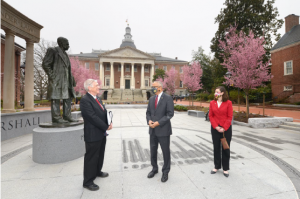Rural Maryland Council Hosts Grab & Go Lunch For Legislators on Maryland Day

Photo Caption: Rural Maryland Council Chair John Hartline, with Lieutenant Governor Boyd Rutherford and Secretary of Maryland Department of Natural Resources Jeanie Haddaway-Riccio during Maryland Day, March 25, 2021, Photo Credit: Tom Nappi
Maryland Day is celebrated annually on March 25th, the anniversary of the day The Ark and The Dove
landed at St. Clement’s Island in 1634. Maryland Day has been celebrated since 1903, initially, a day
recognized by the state’s Board of Education to learn about Maryland’s history. In 1916, Maryland
General Assembly first recognized Maryland Day as a legal state holiday.
In recognition of Maryland farmers, watermen, and rural communities, the Rural Maryland Council
hosted a Grab & Go lunch for Legislators on Maryland Day, Thursday, March 25, 2021, at Lawyer’s Mall
in Annapolis sponsored by the Maryland Broadband Cooperative, the Rural Maryland Foundation and the
Southern Maryland Agriculture Development Commission. The bag lunch was supplied by Caroline
County’s Chesapeake Culinary Center that included locally produced foods as well as a sample of
Chesapeake Blue fishcakes.
“The Governor and I very much appreciate the rural communities, our agriculture communities and the
impact those agriculture producers, watermen, and aquaculture-related industries have on the state,” said Lt.
Governor Boyd Rutherford. “Not only for their economic impact, but these individuals and these
industries are protecting the environment because they have to in order to have a good environment to be
able to get the resources from the land and the water.”
Agriculture, aquaculture, and resource-based industries (RBI) are economically important to the entire
state of Maryland, as well as each county and region (i.e. Western, Central, Southern, Eastern Shore, and
subregions). From a recent BEACON study, the total economic impact of resource-based industries in
2015 equaled $23.3 billion, supported over 94,500 jobs, and generated nearly $902 million in state and
local tax revenue. To put these magnitudes into perspective, the economic output of RBI industries is
equivalent to 6.8% of Maryland’s personal income and 6.3% of Maryland’s gross domestic product
(GDP). At the same time, total jobs supported by RBI activities (94,535) equals 3.1% of Maryland’s total
employment.
RMC Chair John Hartline remarked, “In 2020, the Delmarva community raised 570 million chickens, and
produced 4.2 billion pounds of shelf and table ready chicken and provided 17,955 jobs. Chicken house
capacity grew 3 percent. In the middle of the worst pandemic in over 100 years, Maryland’s rural areas
continued to produce food at the same or higher levels for millions and millions of people in suburban
and urban areas. That is why we are here to celebrate on Maryland Day.”
The Secretary of Maryland Department of Natural Resources, Jeannie Haddaway Riccio thanked the
RMC for its efforts. “I want to thank the team at the RMC as well as your board members for all that you
do. You all are excellent ambassadors for rural Maryland. We all know that a strong Rural Maryland
overall means a strong Maryland.”
View a video of the presentation of the event here.
